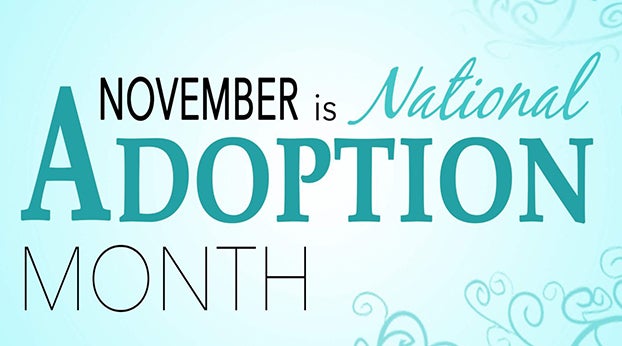November is National Adoption Month
Published 9:24 am Friday, October 29, 2021
|
Getting your Trinity Audio player ready...
|
By Jay Miller, PHD
Every child, no matter the context, needs a permanent family. Having been in out-of-home care myself, I can personally attest to this need.
As a youth, I was placed in out-of-home care as a result of the death of my mother and my father’s inability to beat his addiction to substances. My sisters and I spent several years shuffled from place to place before being taken in by an aunt and uncle.
I was 16.
For my sisters and me, the stability provided by our “forever home” made all the difference. The sense of safety, allowed us to flourish. No more neglect. No more abuse. Frankly, if not for their willingness to open their home and their hearts, I’m not sure where I would be.
Since 1995, November has been marked as a time of deep introspect about adoption. This year, Adoption Awareness Month is focused on engaging young people’s VOICE and leveraging lived experiences to improve adoption.
Perhaps now, more than ever, it is imperative that we all take stock of this focus.
In Kentucky, there are over 9,000 kids in foster care. Of those, almost one-third are waiting to be adopted. Certainly, every effort must be made to preserve families. This includes strong prevention and intervention services. However, the unfortunate reality is that some young people will need to be adopted.
Throughout my career, I have had the privilege of working with adoptive youth and parents at child welfare agencies at the local, state, and federal levels. My personal experiences – particularly the time I spent in out-of-home care – have immensely impacted my professional practice and research with these young people. I choose to look at my personal experiences not as a hindrance but as an asset. These experiences have given me a unique ability to connect with those who are in, or who have experienced, foster care and adoption.
Throughout all of these interactions, I have come to two simple yet profound conclusions: Adoption stakeholders have a unique perspective on adoption processes, AND we, as a society, must work to integrate this perspective into adoption programs, policies, and protocols. These stakeholders include youth, adoptive parents and siblings, birth families, and others.
Historically, the collective voice of adoptive youth has been excluded from the lexicon of child welfare services. Too often adoptees are excluded from research studies or in the conceptualization and implementation of adoption programs and interventions. Sure, adoptees are often invited to share stories of their experiences, usually at annual events or fundraisers. Unfortunately, these stories are often relegated to a moment in time that is more about tugging at hearts of potential donors and far less about learning from these experiences as a mechanism for system improvement.
If the adoption system is to meet their goal of providing safe, stable “forever homes” for young people, agencies and programs must integrate the lived experiences and expertise of adoptees. However, incorporating these experiences will not be easy. Meaningfully integrating the perspectives of those who have experienced adoption will require a fundamental paradigm shift.
In his seminal work, The Structure of Scientific Revolutions, Kuhn explained that paradigm shifts are necessary when existing frameworks and worldviews are no longer able to meet needs. The traditional paradigm of seeing adoptees as passive, incompetent beings participating in a system that needs to be directed by others, is no longer able to meet the needs of the child welfare system. As such, those working with, and in, the child welfare system must adopt a paradigm shift that is grounded on a singular principle: Adoptees have valuable knowledge, insight, and expertise that needs to be integrated into child welfare education, practice, and research.
In order to fully realize the potential of incorporating lived experiences into the child welfare system, we must change the lens through which we view adoption. Adoption is not something we do to children and families. Rather, in some instances, adoption is a process necessary for providing permanency to youth and their families. In as much, we, as a society, must take steps to explicitly improve that process. This includes ensuring that adoptees have a voice in policies, programs, and services that impact them. We can attain this goal by supporting adoptee groups and associations, working to develop youth advisory boards and councils, and advocating that child welfare agencies hire adoptees as employees. No matter the method, we must be intentional about tapping into the unique perspective held by those who have personally experienced adoption.
Dr. Jay Miller is the Dean, Dorothy A. Miller Research Professor in Social Work Education, and Director of the Self-Care Lab in the College of Social Work at the University of Kentucky. Additionally, he is a proud foster and kinship alum. You can follow his work via Twitter @DrJayMiller1.





